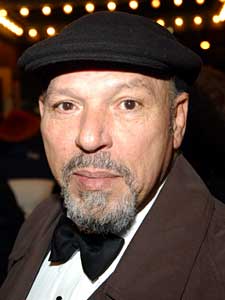 |
| Playwright August Wilson in December 2004. (Brad Barket/Getty Images) |
New York, NY — To Penumbra Theatre Artistic Director Lou Bellamy, the loss of August Wilson is so large it can't be measured. Bellamy says an unusually strong artistic spirit burned in Wilson's soul.
"I just think he was just fierce in his attention to detail, attention to his work, and about telling a truth that had been ignored by so many people," said Bellamy.
Wilson lived in St. Paul between 1978 and 1990. It was during that period he rose to national prominence. Many of his plays premiered regionally at Penumbra, which alongside Wilson was gaining recognition as one of the country's leading black theaters.
|
He was just fierce in his attention to detail, attention to his work, and about telling a truth that had been ignored by so many people.
- Lou Bellamy, Penumbra Theatre
|
Penumbra Theatre Company member James Williams recalled seeing an early production of August Wilson's Ma Rainey, and weeping as the play spiraled toward its tragic, violent ending. Williams says it was the first time a playwright understood the anger and frustration of being a member of an oppressed group in America.
"You think you've got a finger in every hole in the dyke, and something comes along and pokes another hole and things just gush out. And I saw that he got it; I saw that he understood. And I saw that not only did he get it and understand, but that he was going to write about it in all its glory. And I loved that," Williams said.
Wilson came to the Twin Cities in 1978 on the advice of his friend, local actor Claude Purdy, who told him about the vibrant theater scene here, the arts philanthropy and probably most important, the Playwrights' Center. In the early '80s, the Playwrights' Center gave Wilson his first break, a fellowship.
Archibald Leyasmeyer was the Playwrights' Center's board chair at the time. Leyasmeyer says Wilson had very little play-writing experience back then, but had submitted an initial draft of his play "Jitney" as part of his grant application.
"Even from those early drafts of the work, it was very clear that there was a kind of poetic sensibility there that was very striking and very unusual, and I think the body of work that followed over the decades, of course demonstrated how brilliant that ability was," Leyasmeyer said.
August Wilson was born in Philadelphia. He moved to St. Paul in 1978, and moved to Seattle in 1990, where he remained until his death. But Wilson often spoke of his love for the Twin Cities and how important it was in the development of his career. He has said on many occasions that this was the place where he began to hear his voice.
It may seem ironic that an African American would find his artistic identity in a predominantly white community. But to Minnetonka writer and playwright Syl Jones, who was a Playwrights' Center fellow at the same time Wilson was, it makes perfect sense.
"When you find your voice it's against a backdrop of different voices; voices that are not like yours. And I think a lot of African Americans, I know for sure for me, we find out more who we are in comparison with who everybody else is here," Jones said.
Jones says the arc of Wilson's career might have been different had he not landed in Minnesota when he did. Jones believes Wilson benefited greatly from the presence of Penumbra and its artistic director Lou Bellamy, who gave Wilson instant feedback whenever he needed it.
"The theater is nothing if not collaborative. And there's no question that the tutoring that August went through and the refining of his work occurred with masters like Lou, who would take his first drafts of plays and rescale them, reshape them and press him to get to what he really wanted to say, and to do it in a way that was highly theatrical," said Jones.
For his part, Lou Bellamy says he often heard Wilson talk about the special place he had in his heart for the Twin Cities. Bellamy says Wilson felt that way because this was the first place he was truly and fully validated as an artist.
"I don't think it can be overstated, the importance of having an artistic home, a place where people are proud of your work, don't seek to change it, and want to make the very, very best it can be," Bellamy said.
Wilson is known for his 10-play cycle chronicling black life in the 20th century. But Bellamy says Wilson wrote several pieces outside that cycle. He's confident those plays will eventually reach the stage, further ensuring Wilson's voice will live on for generations.




